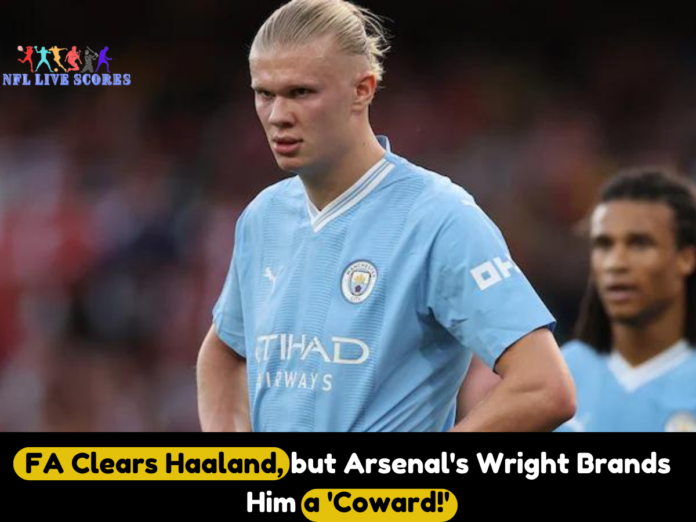Wright
Erling Haaland, Manchester City’s powerhouse striker, has faced considerable scrutiny following a controversial incident in the Premier League. Recently, Haaland found himself at the center of a debate after Arsenal legend Ian Wright publicly branded him a “coward” for an on-pitch altercation. Despite the intensity of the allegations, the Football Association (FA) has officially cleared Haaland of any wrongdoing, causing a ripple effect in the footballing world.
FA Investigation Clears Haaland
The FA’s decision to clear Haaland has sparked discussions in both the media and among football fans. The incident in question occurred during a high-stakes Premier League match between Manchester City and Arsenal. Haaland, known for his physical style of play, was accused of engaging in unsportsmanlike conduct. Arsenal fans and pundits alike criticized his aggressive approach, with some, including Ian Wright, claiming that his behavior crossed the line.
The FA, however, conducted a thorough investigation, reviewing the footage and speaking with match officials. Ultimately, they determined that Haaland’s actions, while aggressive, did not breach any rules. The FA’s decision effectively exonerated the striker, allowing him to continue his dominant form in the league without facing disciplinary action.
Ian Wright’s Scathing Remarks
While the FA may have cleared Haaland, Ian Wright did not hold back in his criticism. Wright, a revered figure in Arsenal’s history and now a well-respected football pundit, labeled Haaland a “coward” during a post-match analysis. According to Wright, Haaland’s actions were unbecoming of a professional footballer, and he expressed disappointment that the striker was not penalized.
Wright’s comments have ignited a broader debate about the physical nature of football. Some have supported Wright’s stance, arguing that players like Haaland, who rely heavily on their physicality, should be held to a higher standard of discipline. Others, however, feel that Wright’s comments were overly harsh and that Haaland was simply playing within the bounds of the game.
The Role of Physicality in Modern Football
Haaland’s style of play has often been described as “brutal” but effective. Standing at 6’4″ with an imposing frame, Haaland’s physicality is a key component of his success. His ability to outmuscle defenders, win aerial duels, and create space for himself has made him one of the most feared strikers in world football.
However, the recent altercation with Arsenal has reignited discussions about the fine line between physicality and foul play in modern football. Physicality has always been an integral part of the game, but with increased focus on player safety and the implementation of technologies like VAR (Video Assistant Referee), players must be more mindful of their actions on the pitch.
The FA’s decision to clear Haaland indicates that his play style, while aggressive, is still within the acceptable limits of modern football.Many believe that Haaland’s dominance on the pitch often forces referees to reconsider traditional fouls simply because of his sheer size and strength.
Arsenal Fans React to FA’s Decision
Unsurprisingly, Arsenal supporters were less than pleased with the FA’s ruling. Many felt that Haaland’s actions warranted punishment, especially given the high stakes of the match. Arsenal has a rich history of playing stylish, fluid football, and for many fans, Haaland’s approach represents a more brute-force style that contrasts sharply with Arsenal’s footballing philosophy.
Fans took to social media to voice their frustrations, with some accusing the FA of bias in favor of high-profile players. The decision not to charge Haaland, some argue, sets a dangerous precedent for future physical confrontations on the pitch.
Haaland’s Perspective: “I Play My Game”
Despite the backlash, Haaland has remained unfazed by the criticism. In a post-match interview, Haaland addressed the controversy, stating, “I play my game. I’m here to win, and sometimes that means being physical.” Haaland’s focus on results over perceptions highlights a divide in modern football: between those who prioritize the aesthetics of the game and those who emphasize winning at all costs.
Haaland’s unapologetic approach has garnered both admiration and disdain. For many City fans, Haaland’s physicality is part of what makes him such an effective player. His ability to overpower defenders and dominate in critical moments has been key to Manchester City’s recent success. For others, however, his style represents a step back in the evolution of football, a return to a more combative and less skillful approach.
The Implications for Future Matches
As Haaland continues his journey in the Premier League, the FA’s decision to clear him could have far-reaching implications. Other players may feel emboldened to adopt a more physical style, knowing that the FA has shown leniency in such cases. This could lead to an increase in on-pitch altercations and, potentially, more injuries.
Conversely, the FA’s decision could also encourage referees to scrutinize similar incidents more closely in the future. If the public and players alike feel that the FA is too lenient, there could be growing pressure on officials to intervene more frequently during matches to curb overly aggressive behavior.
The Broader Debate: Physicality vs. Skill
The Haaland incident touches on a broader debate that has been simmering in football for years: the balance between physicality and skill. While players like Haaland and Cristiano Ronaldo have built their careers on a combination of strength and technical ability, there is an increasing demand for more finesse-driven football. This is particularly true in leagues like the Premier League, where clubs like Arsenal, Liverpool, and Manchester City have championed a more fluid, possession-based style.
The debate isn’t just about aesthetics. It’s also about the future of football as a sport. If physicality is allowed to dominate, it could lead to a shift in how the game is played and coached, with more emphasis on strength and athleticism over technical skills and creativity.
Also Read:>
From Triumph to Turmoil: Australia’s Shocking Decline in the Second ODI Against England
Also Read:>
One-Day Cup final: Somerset stuttering in 187 chase against Glamorgan

